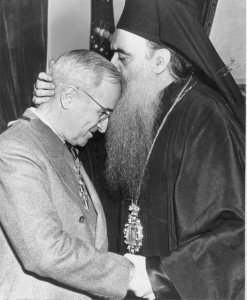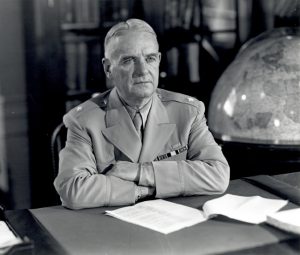Early CIA Conquest of Greek Orthodoxy in America and Turkey.
Greek Archbishop to proto-CIA: "Your directions will be executed faithfully." - Orthodox History
It’s long been an open secret that Patriarch Athenagoras’ election as Ecumenical Patriarch was arranged, or at least facilitated, by the United States government. It’s difficult to write about this as an historian, though, because smoking guns for that kind of thing tend to be kept under wraps. Occasionally, though, something slips out. I was recently paging through old documents on the CIA database that were released under the Freedom of Information Act (FOIA). One file contains a big batch of papers from CIA’s predecessor agency, the OSS, all focused on Greece during World War II. Buried in the nearly 300 pages of that PDF are several items pertaining to Athenagoras, who at the time was Archbishop of the Greek Archdiocese of North and South America.
In an OSS interoffice memo dated March 26, 1942, an intelligence agent named Ulius L. Amoss wrote this to a fellow OSS agent named David Burns:
The Archbishop was extremely pleased at having met and lunched with you. He has told me that the entire facilities of his organization are at our disposal. He put it in these words:
“I have three Bishops, three hundred priests and a large and far flung organization. Every one under my order is under yours. You may command them for any service you require. There will be no questions asked and your directions will be executed faithfully. Please tell Mr. Burns for me that this is so.”
A month later, on April 25, the 56-year-old Greek Archbishop attempted to enlist in the U.S. Army. He was turned down.
A few weeks after that, on May 14, Ulias Amoss, the same intelligence agent who wrote the March 26 memorandum, wrote a letter to Athenagoras, thanking him for the Greek Archdiocese’s ongoing cooperation, saying, in part, “The care with which your Bishops and Priests have cooperated has impressed everyone and the report that, perhaps, as many as a hundred thousand names will be returned to us is astounding.” On the same day, William J. Donovan himself — the head of the OSS — also wrote to Athenagoras, “The reports and descriptions of Greek-American youth of military age so kindly undertaken by you are coming in in splendid volume. The care with which Your Grace has managed this important service is of great interest to our armed services and I wish to express my deep appreciation for your loyal and patriotic assistance.”
Donovan then apparently went out of town, so Athenagoras waited to reply until July 16. Here’s the full text of the Archbishop’s letter:
My dear Mr. Donovan:
I received your cordial letter of May 15th, but upon learning that in the meantime you had departed, I waited until you return to write to you.
I welcome you and thank you from the bottom of my heart for your letter and its contents. You have obligated me very much, because I think I don’t do very much for the U.S., to whom I am deeply indebted.
I am ready though to submit myself to any duty and to make every possible sacrifice for our beloved Country, which is fighting for Universal freedom and justice and for the New Day which is to come.
I was in Washington a few days ago, and would have come to see you if I hadn’t been called back to N.Y. Rest assured though, that at my first opportunity I shall come to Washington to meet you personally, and express my sincere admiration toward you.
Sincerely yours,
Archbishop Athenagoras
It’s pretty amazing that these documents are public, as they represent the beginnings of the fairly well-known but not well-documented relationship between Archbishop Athenagoras and US intelligence officials. In 1942, Athenagoras proved himself a reliable ally of the U.S. government, and while his wartime patriotism is not necessarily unusual, his language is almost shockingly strong: “There will be no questions asked and your directions will be executed faithfully.”
In the years that followed, Archbishop Athenagoras remained a valuable resource for US intelligence. An OSS report prepared sometime after December 31, 1944, lists Athenagoras among its key contacts. This OSS report comments, “The State Department and other executive agencies can hardly cultivate contacts of this sort freely without putting an official cachet on the individuals in question and inviting criticism from politically hostile quarters. It has been possible for the Foreign Nationalities Branch [of the OSS], however, to talk intimately and as frequently as needed with such men.” The list of “such men” includes not only Athenagoras but also the Albanian Bishop Fan Noli and the Serbian Bishop Dionisije Milivojevich.
The relationship between Athenagoras and the US government proved to be mutually beneficial. When Athenagoras was elected Ecumenical Patriarch in late 1948, he was flown to Istanbul on President Truman’s presidential plane (which was named, bizarrely, the “Sacred Cow”). From his new post at the Phanar, Athenagoras served as a pro-American counterweight to the pro-Soviet Moscow Patriarchate. But that is a story for another day.



Comments
Post a Comment